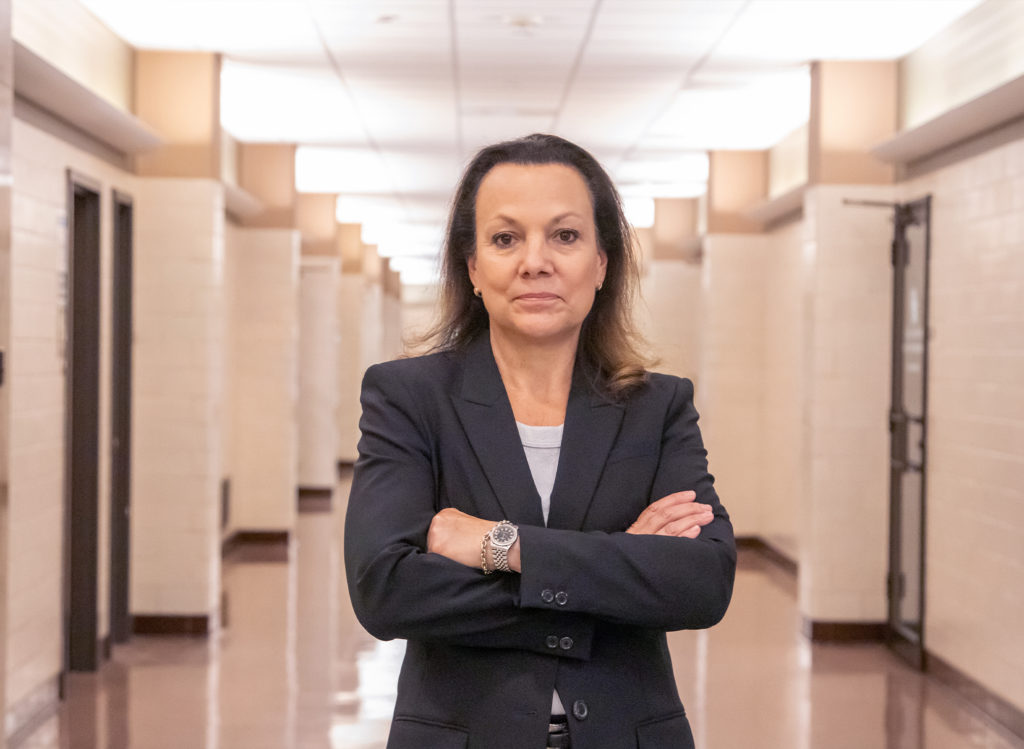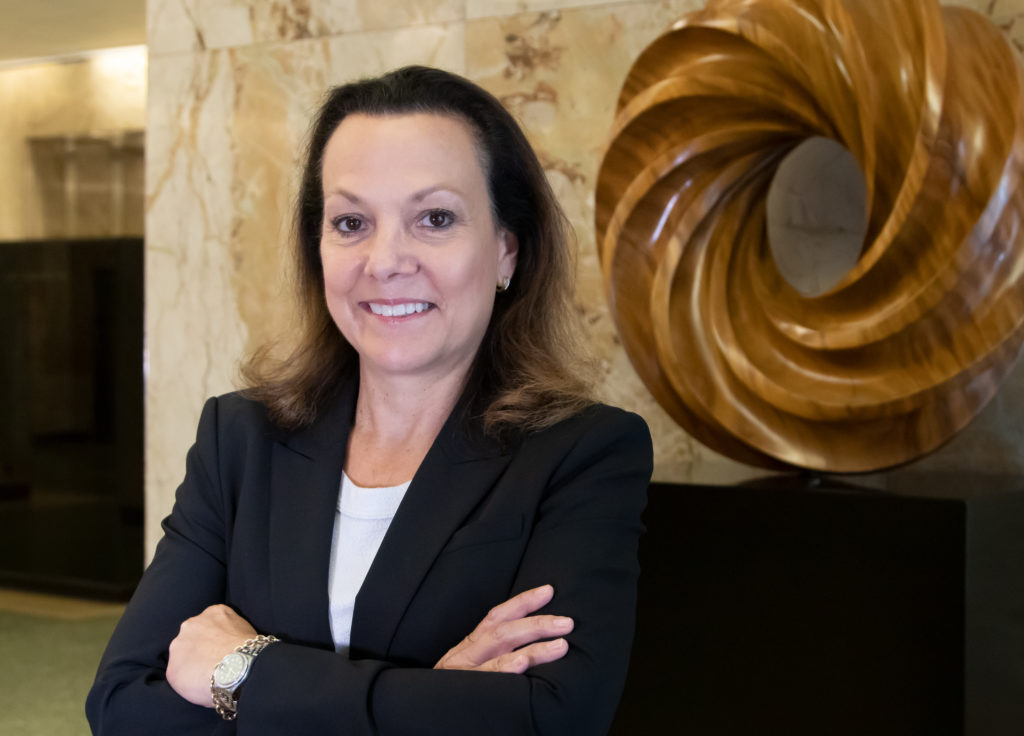
Dona Cornell was Texas’ deputy chief attorney general over litigation in 2002 when the president at the University of Houston System called about the open general counsel job at the institution.
Cornell, who had just won a big case for the university, said thanks, but no thanks. She liked living in Austin, where she had gone to college, law school and worked for the past 15 years.
The university president called again. And again. And again.
“I eventually said yes,” she said. “It seemed like it would be a slower pace, but I was so wrong. It is more like being in trial all the time. I really love what I do and the mission of UH, as well as the other campuses in the UH System which I am also responsible for.”
Twenty years later, Cornell is still the chief legal officer for the university system, which has an annual budget of more than $1.8 billion, more than 10,000 employees and 77,000 students. She and her legal team of 10 have immense responsibilities and are involved in nearly every aspect of the UH System’s operations — from contracts, conveyances and employment law to academic and student matters to real estate, construction, intellectual property and immigration.
During the past two years, Cornell has been front and center on UH System’s decisions involving Covid-19, the university’s invitation to join the Big 12 Conference and significant changes to higher education law including Title IX.
Cornell said the job of GC has grown “exponentially” during the past few years.
“Universities seem to be at the forefront of all social issues, and we are incredibly highly regulated by the state and even more so on the federal side,” Cornell told The Texas Lawbook in an exclusive interview.
Premium Subscribers: Click Here for a Q&A with Dona Cornell, where she talks about her best day on the job and what she looks for in the next generation of lawyers.
The Association of Corporate Counsel’s Houston Chapter and The Texas Lawbook, citing the extraordinary challenges she has faced and the successes she has achieved during the past two years, are awarding the 2022 Houston Corporate Counsel Award for General Counsel of the Year for a Nonprofit/Public Institution to University of Houston Systems General Counsel Dona Hamilton Cornell.
ACC Houston and The Lawbook are honoring all 2022 Houston Corporate Counsel Award finalists and winners May 19.
“Dona has always been a force and a trailblazer,” said Tiffany Melchers, a shareholder at BoyarMiller. “Throughout the … response to Covid-19, Dona was a steady hand at the university, advising the chancellor and board of regents on novel issues due to the pandemic, while allowing the school to maintain excellent academic standards.”
“Then throw in negotiating the university into the Big 12 conference last year, which has such a significant and long-term impact for the university, it becomes clear that the general counsel for this institution shoulders an immense responsibility behind the scenes, where most of the action occurs but is never seen by the rest of the world,” said Melchers, who nominated Cornell for the award.
Scott Marrs, managing partner of the Houston office of Akerman, said Cornell has “great intuition and instincts” that enable her to “navigate the gray areas that GCs of state universities face daily.”
“Dona’s world – five sprawling campuses, two police departments, students, faculty and staff with 24/7 issues – is full of nuance,” Marrs said. “There is seldom one right answer or solution. Her combination of instinct, ability to act quickly and with precision, to identify potential problems and act proactively, and her no-nonsense approach makes her an effective protector of the university’s stakeholders.”
Cornell was born in Missouri but grew up mostly on the East Coast. During her sophomore year of high school, the family moved to Texas.
“It was quite the culture shock to move to the outskirts of San Antonio where kids still rode horses to school,” she said.
Cornell’s father was an engineer for a large corporation that believed in transferring their executives to various offices across the country. He would have Cornell work on math and vocabulary after Sunday dinners. Her mother had a multitude of jobs, everything from marketing research to housekeeping.
After graduating from the University of Texas with a bachelor’s degree in economics, Cornell worked for the Texas House of Representatives as a clerk and aide to the committee on state, federal and international relations, where she did research and prepared committee reports.
“I really thought I would go back to school but only for an MBA,” she said. “Working in the legislature was all the influence I needed and pushed me to law school.”
After a one-year stint back with the Texas Legislature as assistant director for bill analysis, Cornell joined the Texas attorney general’s office.
“I felt drawn to litigation as many new lawyers do and they wanted someone who understood the legislative process as the cases I worked on needed significant state funding,” she said.
Cornell worked in the AG’s general litigation division and handled several class actions involving care for persons with mental illness and developmental disabilities, as well as the statewide school desegregation cases that started in the 1970s.
“I also handled many employment cases and other constitutional claims,” she said. “I really became a constitutional lawyer without realizing it.”

In 1990, Cornell was an assistant state attorney general handling a class action called Lelsz v. Kavanaugh, which challenged the adequacy of conditions of three state-operated institutions for the mentally ill. U.S. District Chief Judge Barefoot Sanders in Dallas ordered a show cause hearing with very little advanced notice.
Cornell, however, was on maternity leave with a two-week-old daughter.
“Dona was the lawyer most aware of the case and felt a commitment to argue the motion herself,” Melchers said. “So she drove herself and her newborn to the courthouse and made her arguments. Because that is who Dona is. She is 100 percent committed to her clients, is one of the most capable attorneys I’ve ever known and always delivers, even if under pressure.”
Cornell said she had help that day.
“My husband rolled her up and down the halls while I was in court,” she said.
In 1992, Cornell joined Morehead, Jordan & Carmona as a shareholder at the small Austin litigation boutique. The firm handled plaintiff and defense cases and was at the forefront of filmed evidence in the years before every cellphone had a camera.
“We represented the Headliner’s Club at the top of an office tower in Austin against the building which decided to remove the roof with a terrible rain event in the forecast,” she said. “We called up our deposition video folks and had them go up there to film the event with a foot of water in the club. It was perfect.”
The Texas attorney general’s office recruited Cornell back to public service in 1995, where she supervised 30 lawyers and oversaw more than 700 litigation matters, including many cases for the various state universities in Texas, including Texas A&M, UT and UH.
Cornell officially became the general counsel of the University of Houston System in June 2002.
She says the biggest challenge during her two decades at UH has been “to balance so many moving parts with so many legal issues.”
“A couple of areas were not really on the radar 20 years ago, one being Title IX, which has taken on a life of its own and is high stakes for the institution and for those involved,” she said.
Cornell also said compliance issues related to cybersecurity, undue foreign influence and the Clery Act, a federal law that deals with on campus crimes and criminal statistics, also requires a lot of her department’s time.
“Free speech has been litigated quite a bit over the years, but it too has taken on a new heightened life in 2022,” she said. “The other aspect is that I have so much institutional knowledge that many come to me for that history to guide new initiatives. Suffice it to say, I am busier than ever.”
Cornell said her biggest litigation successes are often “quiet and under the radar, where I want them to be.” But UH has won some big plaintiff’s side cases on trademark and patent infringement.
“We have done some incredible things at UH in the last 20 years, and for that I have been part of the village making that happen,” she said. “We have had almost $2 billion in construction across the UH System as we have expanded our footprints at each of our campuses.”
The Covid pandemic also presented myriad legal issues for the university system.
“This was a very busy time because no one knew exactly what to do, and the stakes were so high that my team and I were involved every step of the way,” she said. “This included when and how to shut down, what to do about all of our contracts, how to handle those that were living on campus and more importantly, how to deliver education virtually.”
Darren Gibson, a shareholder at Littler Mendelson and former colleague at the Texas attorney general’s office, said that Cornell is “an impassioned advocate, as well as a pragmatic and strategic problem-solver.”
“Dona will go to battle if necessary, [but] she is always looking for creative solutions and thinking strategically beyond just the immediate task at hand,” he said.
Lawyers who work with Cornell repeatedly comment on her kindness and graciousness.
Gibson said he was representing UH in an employment litigation case a few years ago and drove from Austin to Houston to conduct a few days of depositions and witness preparation during the Houston Rodeo.
“Dona asked where I was staying that night,” he said. “I could not find a hotel anywhere nearby at a state-approved rate, and the only room available was at a budget motel in Pasadena – about a 45-minute drive.”
Gibson shared his predicament with Cornell, expecting them to simply share a laugh about the challenges of traveling as a state employee.
“Instead, Dona said that my lodging situation was unacceptable and invited me to stay the night in her home with her family instead,” Gibson said. “I politely declined, not wanting to intrude. Dona made it clear that her invitation was sincere, and she did not want me to spend the evening at a second-rate motel a long drive away.
“That evening, she introduced me to her husband and daughter, and she made a wonderful pasta dinner for the four of us,” he said. “It was the type of hospitality and generosity you would expect from a good friend. We had a delightful evening together, and I felt honored to be a member of the U of H team.”
